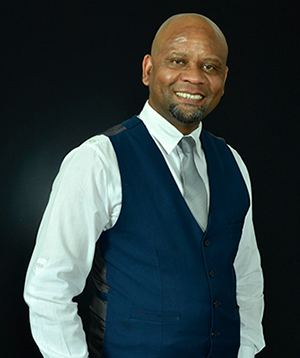
Towards the leading College of Law and Justice in Africa
Having been invited to represent South Africa (SA) at the BRICS Expert Round Table on Anti-Corruption Education and Training on 1 December 2020, Dr Benni K Lekubu says it means that Unisa is well vested and recognised for its mission and vision of "Towards the African university shaping futures in the service of humanity". For Lekubu, an anti-corruption specialist and senior lecturer at the Department of Police Practice in the College of Law (CLAW) at Unisa, the invitation reinforces the international recognition that the department, college and university at large enjoy.


Dr Benni K Lekubu (Anti-corruption specialist and Senior Lecturer: Department of Police Practice, CLAW, Unisa) says academic excellence has no lockdown restrictions.
While Lekubu further sees the invitation as meaning that the university has the required and relevant expertise to be competitive at an international and any other level, he expressed that it is exhilarating and nerve-racking at the same time, considering the expertise and seasoned individuals invited to also participate at this international platform. "This is the highlight of my academic career in 2020 amid the Covid-19 pandemic and all the lockdown restrictions in the country. There is no time to relax even when working from home. Academic excellence has, in this regard, no lockdown restrictions."
Lekubu highlighted that the importance of education in fighting corruption is recognised by Article 13 of the United Nations Convention Against Corruption (UNCAC). The article makes provision for each state party to take appropriate measures within its means in the prevention and fight against corruption by raising awareness of its existence and causes. Furthermore, experts and university lecturers from the BRICS countries participated in the Second Anti-Corruption Academic Symposium and an Education for Justice Round Table in Moscow last November, which was organised under the auspices of the Anti-Corruption Academic Initiative of the United Nations Office on Drugs and Crime.
"Based on this positive experience, the Russian Federation identified anti-corruption education as one of the priorities of its BRICS Presidency in 2020 and suggested holding an expert round table on anti-corruption education and training to exchange views on and practices related to specific aspects of anti-corruption education, from the global approach to raising public awareness about corruption in line with Article 13 of the UNCAC, to thematic university curricula and professional training for practitioners and civil servants," he explained.
You can jump to 1:28:48 to see Dr Lekubu’s presentation.
Lekubu completed his PhD in Criminal Justice, entitled A critique of the South African Anti-Corruption Strategies and Structures: A comparative analysis, and a Postgraduate Certificate in Corruption Studies with the University of Hong Kong in 2015. His passion and interest to assist the country in fighting corruption grew enormously. Considering his expert contributions on different platforms, it is fitting to see him as the country’s anti-corruption warrior and having the country’s best interests at heart.
Among others, he has been featured on various radio and television platforms to tackle matters related to corruption, and has written opinion pieces for The Presidency Ethics Barometer Magazine and The Conversation Africa. The Department of Public Service and Administration (DPSA) also invited him to participate in an online meeting to review the implementation of UNCAC by South Africa. The review focused on chapters II (Preventive Measures) and V (Asset Recovery) of the convention.
With SA battling the scourge of corruption and other self-serving behaviours, "the ill-effects of corruption on the society, polity, and economy of a country are far reaching. They have a corrosive effect on the rule of law, on governance and on the welfare of the society. The Constitution of the Republic of South Africa of 1996, which is the supreme law of the country, places as an expectation and obligation on the government accountability of state, and a government free of corruption and the malignancy of economic nepotism," reiterated Lekubu.
In his presentation to BRICS, he said that now is the time to reimagine education to fight corruption. According to Lekubu, universities can play a major role in fighting corruption, both in their capacity as institutions of higher learning that touch the lives of future leaders and as large organisations with substantial economic footprints. "Through their curricula, universities should ensure the production of graduates who abhor corruption. In turn, these graduates will transmit anti-corruption values to those they have opportunities to lead or interact with in their communities," he concluded.
* By Nancy Legodi, Acting Journalist, Department of Institutional Advancement
Publish date: 2020-12-04 00:00:00.0